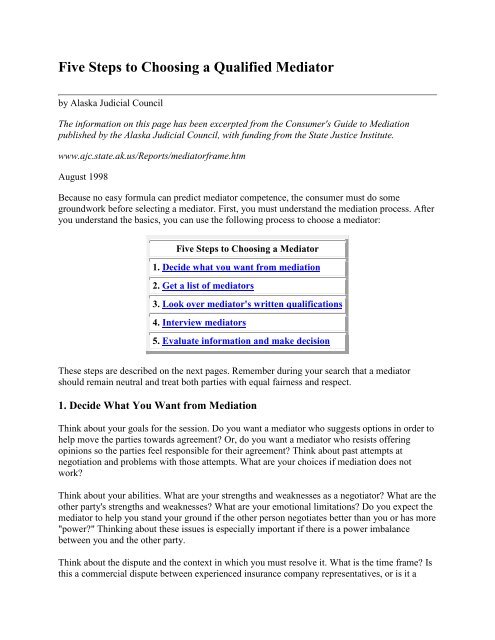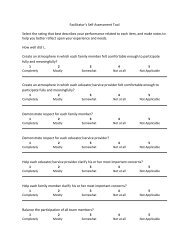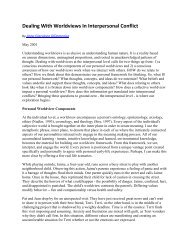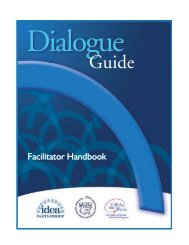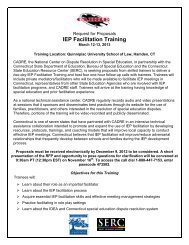Five Steps to Choosing a Qualified Mediator.pdf - Direction Service
Five Steps to Choosing a Qualified Mediator.pdf - Direction Service
Five Steps to Choosing a Qualified Mediator.pdf - Direction Service
You also want an ePaper? Increase the reach of your titles
YUMPU automatically turns print PDFs into web optimized ePapers that Google loves.
<strong>Five</strong> <strong>Steps</strong> <strong>to</strong> <strong>Choosing</strong> a <strong>Qualified</strong> Media<strong>to</strong>r<br />
by Alaska Judicial Council<br />
The information on this page has been excerpted from the Consumer's Guide <strong>to</strong> Mediation<br />
published by the Alaska Judicial Council, with funding from the State Justice Institute.<br />
www.ajc.state.ak.us/Reports/media<strong>to</strong>rframe.htm<br />
August 1998<br />
Because no easy formula can predict media<strong>to</strong>r competence, the consumer must do some<br />
groundwork before selecting a media<strong>to</strong>r. First, you must understand the mediation process. After<br />
you understand the basics, you can use the following process <strong>to</strong> choose a media<strong>to</strong>r:<br />
<strong>Five</strong> <strong>Steps</strong> <strong>to</strong> <strong>Choosing</strong> a Media<strong>to</strong>r<br />
1. Decide what you want from mediation<br />
2. Get a list of media<strong>to</strong>rs<br />
3. Look over media<strong>to</strong>r's written qualifications<br />
4. Interview media<strong>to</strong>rs<br />
5. Evaluate information and make decision<br />
These steps are described on the next pages. Remember during your search that a media<strong>to</strong>r<br />
should remain neutral and treat both parties with equal fairness and respect.<br />
1. Decide What You Want from Mediation<br />
Think about your goals for the session. Do you want a media<strong>to</strong>r who suggests options in order <strong>to</strong><br />
help move the parties <strong>to</strong>wards agreement? Or, do you want a media<strong>to</strong>r who resists offering<br />
opinions so the parties feel responsible for their agreement? Think about past attempts at<br />
negotiation and problems with those attempts. What are your choices if mediation does not<br />
work?<br />
Think about your abilities. What are your strengths and weaknesses as a negotia<strong>to</strong>r? What are the<br />
other party's strengths and weaknesses? What are your emotional limitations? Do you expect the<br />
media<strong>to</strong>r <strong>to</strong> help you stand your ground if the other person negotiates better than you or has more<br />
"power?" Thinking about these issues is especially important if there is a power imbalance<br />
between you and the other party.<br />
Think about the dispute and the context in which you must resolve it. What is the time frame? Is<br />
this a commercial dispute between experienced insurance company representatives, or is it a
divorce involving an emotional child cus<strong>to</strong>dy decision? The approach or model that commercial<br />
disputants might prefer may differ greatly from the one preferred by a mother and father.<br />
Consider your budget. How much you can spend might limit your choice of media<strong>to</strong>r or<br />
mediation program.<br />
Many media<strong>to</strong>rs and dispute resolution firms or services can help you understand what services<br />
would be best for your dispute. Some will contact the other party <strong>to</strong> the dispute <strong>to</strong> introduce the<br />
concept of mediation.<br />
2. Compile a List of Names.<br />
You can get a list of media<strong>to</strong>rs from the Locate A Media<strong>to</strong>r database.<br />
Word of Mouth. Ask a friend, your at<strong>to</strong>rney, your therapist, or another professional. Describe<br />
your case <strong>to</strong> a media<strong>to</strong>r and ask, "Other than yourself, who are the most skilled media<strong>to</strong>rs in this<br />
kind of case?" Talk <strong>to</strong> people who have been in a mediation with the media<strong>to</strong>r (you can ask the<br />
media<strong>to</strong>r for names of clients). What was their case about and what were their impressions of the<br />
media<strong>to</strong>r?<br />
Written Lists. Check local listings in the Yellow Pages. Many local mediation organizations<br />
maintain direc<strong>to</strong>ries of member-media<strong>to</strong>rs.<br />
Referral <strong>Service</strong>s. Many national media<strong>to</strong>r membership organizations and trade organizations<br />
keep lists of practitioner members and offer referral services. Some may charge for the referral<br />
services.<br />
3. Evaluate Written Materials.<br />
Call or write several media<strong>to</strong>rs on your list and ask them <strong>to</strong> send you their promotional materials,<br />
resume, references and a sample of their written work. These materials should cover most of the<br />
following <strong>to</strong>pics.<br />
Mediation Training. How was the media<strong>to</strong>r trained? Some media<strong>to</strong>rs receive formal classroomstyle<br />
training. Some participate in apprenticeships or in men<strong>to</strong>ring programs. While training<br />
alone does not guarantee a competent media<strong>to</strong>r, most professional media<strong>to</strong>rs have had some type<br />
of formal training. How many hours of training has this media<strong>to</strong>r had? How recent was the<br />
training?<br />
Experience. Evaluate the media<strong>to</strong>r's type and amount of experience (number of years of<br />
mediation, number of mediations conducted, types of mediations conducted). How many cases<br />
similar <strong>to</strong> yours has the media<strong>to</strong>r handled? A media<strong>to</strong>r's experience is particularly important if he<br />
or she has limited formal training.<br />
Written Work. Some media<strong>to</strong>rs will write up notes about agreements or even draft agreements<br />
for the parties. Other media<strong>to</strong>rs do not prepare written agreements or contracts. If your media<strong>to</strong>r
will prepare written work, you may want <strong>to</strong> review a sample. Samples could include letters,<br />
articles or promotional materials. Any sample of the media<strong>to</strong>r's written work should be clear,<br />
well organized, and use neutral language. Agreements or contracts should have detailed<br />
information about all items upon which the parties have agreed.<br />
Orientation Session. Some media<strong>to</strong>rs offer an introduc<strong>to</strong>ry or orientation session after which the<br />
parties decide whether they wish <strong>to</strong> continue. Is it offered at no cost, reduced cost, or otherwise?<br />
Cost. Understand the provider's fee structure. Does the media<strong>to</strong>r charge by the hour or the day?<br />
How much per hour/day?<br />
Other Considerations. Find out whether the media<strong>to</strong>r carries professional liability insurance<br />
which specifically covers mediation. Is the media<strong>to</strong>r certified, and if so by whom? While<br />
certification usually shows the media<strong>to</strong>r has completed a specific amount of training or<br />
education, training and education do not guarantee competence.<br />
Does the media<strong>to</strong>r belong <strong>to</strong> a national or local mediation organization, and is the media<strong>to</strong>r a<br />
practicing or general member? Cost may prevent some competent media<strong>to</strong>rs from joining<br />
organizations, becoming certified, or carrying liability insurance.<br />
4. Interview the Media<strong>to</strong>rs.<br />
Talk <strong>to</strong> the media<strong>to</strong>rs in person or by phone. During the interview, observe the media<strong>to</strong>r's<br />
interpersonal and professional skills. Qualities often found in effective media<strong>to</strong>rs include<br />
neutrality, emotional stability and maturity, integrity, and sensitivity. Look also for good<br />
interviewing skills, verbal and nonverbal communication, ability <strong>to</strong> listen, ability <strong>to</strong> define and<br />
clarify issues, problem-solving ability, and organization.<br />
During the conversation, you also may want <strong>to</strong> ask questions about matters covered in the written<br />
materials and other <strong>to</strong>pics. Some <strong>to</strong>pics <strong>to</strong> discuss in the interview include:<br />
Training, Knowledge and Experience.<br />
Ask the media<strong>to</strong>r, "How has your education and experience prepared you <strong>to</strong> help us work out this<br />
specific dispute?" If the media<strong>to</strong>r had formal training, did it include role play and observations of<br />
skilled media<strong>to</strong>rs? While training and education do not guarantee competence, training is most<br />
effective when it includes practice-oriented segments such as role play and observation.<br />
Ask "Do you participate in continuing education, on-going supervision, or consultation?" Many<br />
professional mediation organizations encourage or require their members <strong>to</strong> participate in<br />
ongoing education or other professional development.<br />
People often ask whether a media<strong>to</strong>r should be an expert in the subject of the dispute. For<br />
example, should the media<strong>to</strong>r in a commercial mediation be an expert on industry standards and<br />
practices? The answer depends on the type of dispute, the mediation program (for example,<br />
court-referred or administrative agency), and the parties' expectations and needs. Ask the
media<strong>to</strong>r if he or she thinks subject-matter expertise is necessary for this dispute, and why or<br />
why not.<br />
In some cases, the parties may prefer a media<strong>to</strong>r with no special knowledge of the subject.<br />
Benefits of this approach include avoiding a media<strong>to</strong>r's preconceived notions of what a<br />
settlement should look like and letting the parties come up with unique or creative alternatives.<br />
In other cases, for example where the subject of the dispute is highly technical or complex, a<br />
media<strong>to</strong>r who comes <strong>to</strong> the table with some substantive knowledge could help the parties focus<br />
on the key issues in the dispute. Or, parties may want someone who understands a cultural issue<br />
or other context of the dispute.<br />
Style.<br />
Ask "What values and goals do you emphasize in your practice?" For example, does the<br />
media<strong>to</strong>r encourage the parties <strong>to</strong> communicate directly with each other, or does he or she<br />
control the interchanges? The media<strong>to</strong>r should be able <strong>to</strong> describe his or her style of mediation<br />
and his or her role in the mediation process. Remember that different media<strong>to</strong>rs may practice<br />
their craft in different ways, although some media<strong>to</strong>rs can change their style <strong>to</strong> suit the parties'<br />
specific needs.<br />
Another stylistic difference is the use of caucus. A caucus is a meeting between one of the parties<br />
and the media<strong>to</strong>r without the other party present. Some media<strong>to</strong>rs caucus frequently during the<br />
mediation, while others seldom or never use this procedure. Ask the media<strong>to</strong>r whether he or she<br />
uses caucuses, and if so, when.<br />
If the media<strong>to</strong>r works for or is associated with a mediation program or organization, ask what<br />
values and goals the program emphasizes. For example, the style or requirements of a media<strong>to</strong>r<br />
who practices in a court program designed <strong>to</strong> reduce court caseloads may differ from the style of<br />
someone whose practice does not involve the same time pressure.<br />
Ethics.<br />
Ask "Which ethical standards will you follow?" (You may ask for a copy of the standards). All<br />
media<strong>to</strong>rs should be able <strong>to</strong> show or explain their ethical standards (sometimes called a code of<br />
conduct) <strong>to</strong> you. If the media<strong>to</strong>r is a lawyer or other professional, ask what parts of the<br />
professional code of ethics will apply <strong>to</strong> the media<strong>to</strong>r's services. Ask the media<strong>to</strong>r, "Do you have<br />
a prior relationship with any of the parties or their at<strong>to</strong>rneys?" The media<strong>to</strong>r should reveal any<br />
prior relationship or personal bias which would affect his or her performance, and any financial<br />
interest that may affect the case.<br />
Confidentiality.<br />
The media<strong>to</strong>r should explain the degree of confidentiality of the process. The media<strong>to</strong>r may have<br />
a written confidentiality agreement for you and the other party <strong>to</strong> read and sign. If the mediation<br />
has been ordered by the court, ask the media<strong>to</strong>r whether he or she will report back <strong>to</strong> the court at
the conclusion of the mediation. How much will the media<strong>to</strong>r say about what happened during<br />
mediation? How much of what you say will the media<strong>to</strong>r report <strong>to</strong> the other disputants? Does the<br />
confidentiality agreement affect what the disputants can reveal about what was said? If the<br />
parties' at<strong>to</strong>rneys are not present during the mediation, will the media<strong>to</strong>r report back <strong>to</strong> them, and<br />
if so, what will the media<strong>to</strong>r say? The media<strong>to</strong>r should be able <strong>to</strong> explain these things <strong>to</strong> you.<br />
Logistics.<br />
Who will arrange meeting times and locations, prepare agendas, etc.? Will the media<strong>to</strong>r prepare<br />
a written agreement or memorandum if the parties reach a resolution? What role do the parties'<br />
lawyers or therapists play in the mediation? Does the media<strong>to</strong>r work in teams or alone?<br />
Cost.<br />
Ask "How would you estimate costs for this case?; How can we keep costs down?" Are there<br />
any other charges associated with the mediation? Does the media<strong>to</strong>r perform any pro bono (free)<br />
services or work on a sliding fee scale? If more than one media<strong>to</strong>r attends the session, must the<br />
parties pay for both? Does the media<strong>to</strong>r charge separately for mediation preparation time and the<br />
actual mediation?<br />
5. Evaluate Information and Make Decision.<br />
During the interviews, you probably observed the media<strong>to</strong>rs' skills and abilities at several<br />
important tasks. These tasks, which media<strong>to</strong>rs perform in almost all mediations, include:<br />
• gathering background information,<br />
• communicating with the parties and helping the parties communicate,<br />
• referring the parties <strong>to</strong> other people or programs where appropriate,<br />
• analyzing information,<br />
• helping the parties agree,<br />
• managing cases, and<br />
• documenting information.<br />
Ask yourself which of the media<strong>to</strong>rs best demonstrated these skills. Did the media<strong>to</strong>r understand<br />
your problem? Understand your questions and answer them clearly? If the other party was<br />
present, did the media<strong>to</strong>r constructively manage any expressions of anger or tension? Did the<br />
media<strong>to</strong>r convey respect and neutrality? Did you trust the media<strong>to</strong>r? Did the media<strong>to</strong>r refer you<br />
<strong>to</strong> other helpful sources of information? Understand what was important <strong>to</strong> you? Pick up on an<br />
aspect of the conflict that you were not completely aware of yourself? Did the media<strong>to</strong>r ask<br />
questions <strong>to</strong> find out whether mediation is preferable or appropriate? Understand the scope and<br />
intensity of the case? Of course, not every orientation interview permits the media<strong>to</strong>r <strong>to</strong><br />
demonstrate all these skills, and every media<strong>to</strong>r has relative strengths and weaknesses. But you<br />
should be satisfied that the media<strong>to</strong>r can perform these tasks for you before beginning.<br />
Review the other questions on this checklist. Make sure that the media<strong>to</strong>r's cost and availability<br />
coincide with your resources and timeframe. The other parties <strong>to</strong> the mediation must agree <strong>to</strong>
work with this person, <strong>to</strong>o. You may want <strong>to</strong> suggest two or three acceptable media<strong>to</strong>rs so that<br />
all parties can agree on at least one.<br />
Finally, consider evaluations of others who have used this media<strong>to</strong>r or your own previous<br />
experience with this media<strong>to</strong>r. If applicable, consider the goals and procedures of any<br />
organization with which the media<strong>to</strong>r is associated.


